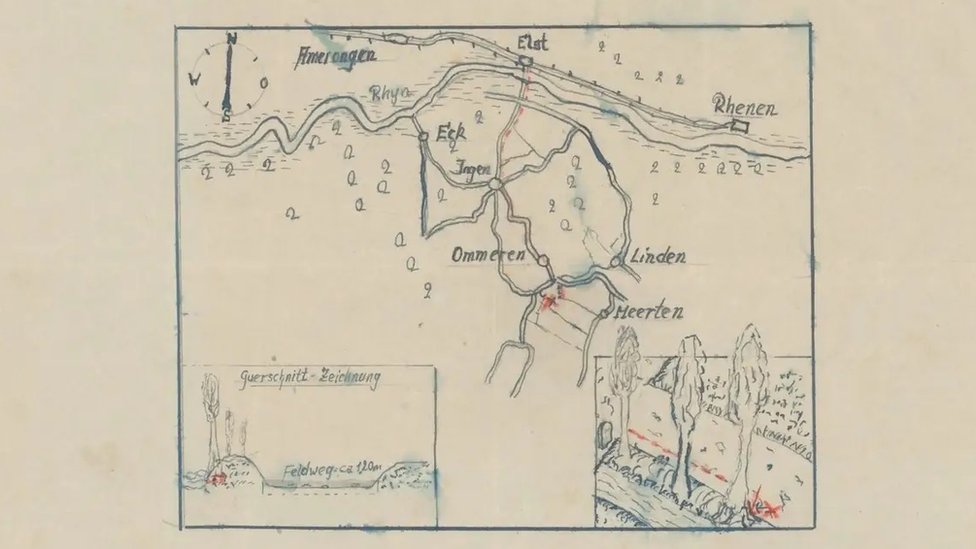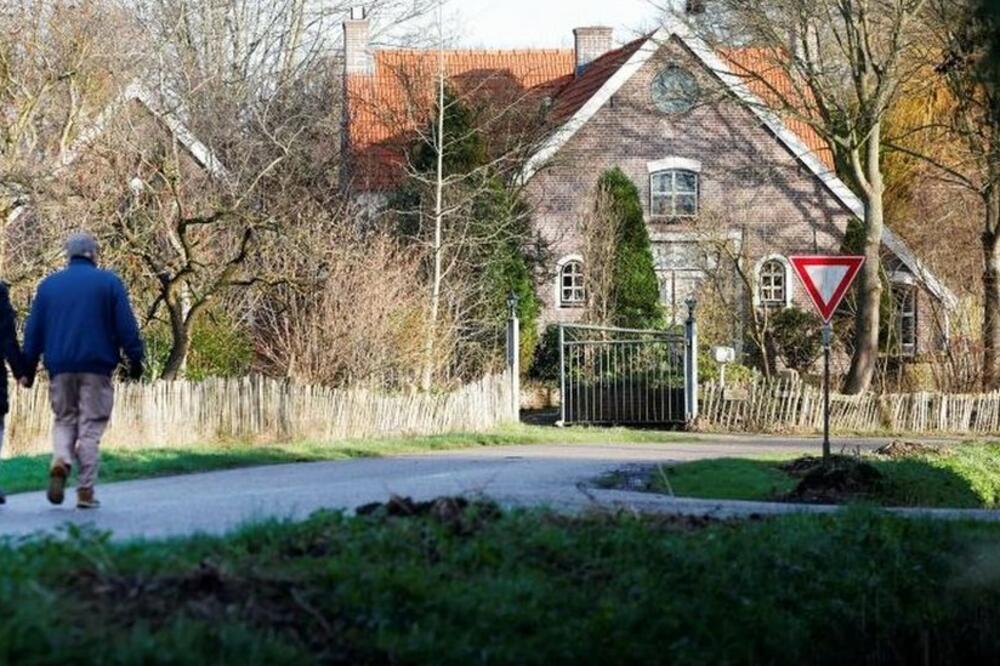Outraged residents of the Dutch village of Omeren are appealing to treasure hunters to leave the site, which they dug up in search of treasure potentially worth several million, allegedly hidden by a German soldier during World War II.
The hunt was sparked by an old map believed to reveal where German soldiers may have buried ammunition boxes full of looted diamonds, rubies, gold and silver.
A hand-drawn map with red markers marking the locations of the treasure is part of a file released by the Dutch National Archives last week.
When the documents were released at the end of the 75-year secrecy period, the declassified map clearly indicated that Omeren, a village in the eastern Dutch province of Gelderland, was where the treasure might lie.
- Treasure hunt successful - found a trunk with valuables worth a million dollars
- Stolen African treasure, escape from the Nazis and paying back the debt to history
- Treasure Hunters: The Lost Coins of Alexander the Great
The village, and its red markings, were near the Allied front line during Operation Market Garden in 1944, a daring airborne attempt to create a land route into northern Germany.
Now there are traces of unauthorized mining all over Omeren.
Old farm equipment that likely set off the metal detectors is scattered around freshly dug craters in farmland and forests.
"I moved here for peace and tranquility.
"Now the whole world knows about us," Sander says, walking his dog Buff.

People knock on his door, asking for directions to the hidden treasure.
He also saw a group of young people digging.
"This area is already rich in history.
"The White Villa, the one over there, was occupied by the Nazis. Now that the new secret has been revealed, it has attracted a lot of interest again," says Sander.
Among documents that have been declassified is also the testimony of a German soldier who stated that a bank in the city of Arnhem, a city 40 kilometers from Omeren, was bombed in August 1944, when jewelry, coins, precious gems and gold watches were scattered from the blasted vault.
Three or four occupying German soldiers took what they could, he said, and hid their own share in ammunition boxes and bread packets - the safest they had on hand.
Later, during the last weeks of the war, the German occupiers were retreating, and the soldiers apparently decided to bury the treasure.
After the war, the Dutch Institute, established to find items stolen by the Nazis, came across the story of a young German paratrooper, identified as Helmut Sonder.
He testified as an eyewitness and sketched the now well-studied map.
The potential legacy is thought to be so valuable that before the map was published, the Dutch government made several attempts to dig up the treasure.
- The horrors of colonialism: How and why the body of one of Africa's greatest heroes, Patrice Lumumba, was mutilated
- The search for the remains of Zimbabwe's anti-colonial heroes leads to Great Britain
A resident of Omeren, 42-year-old Petra van Die, is furious with the Dutch National Archives for releasing the information.
"I can not sleep. The hole they dug hit me here," she says, pointing to her chest.
Journalists come to her window, holding microphones and metal detectors on the land that belongs to her.
Her neighbors were woken up by strangers, flashlights strapped to their foreheads, she says, determinedly digging shovels into their lawns after dark.
Petra wants the gold diggers to leave her village.
"Stay away from other people's property, you have nothing to look for here," he says.
For decades, the map of hidden Nazi treasure and other documents have been kept deep in the National Archives, where men in blue overalls push carts loaded with folders down the narrow aisles of history.
When I visited it, it was busy.
"We didn't expect anything like this," admits Annette Walkens, an information accessibility adviser, as she opens a file of documents dating back to the 1940s.
If they had guessed that the treasure map would tickle the imagination of various people and catapult Omeren into the global limelight, the employees of the Archive would have warned the municipality in advance, he assures me.

Metal detectors have recently been banned in Omeren, because there is a real risk that amateurs will dig up unexploded shells, bombs or land mines from the Second World War.
Fortunately, no injuries were reported, but a number of fines were issued.
If someone found the treasure, he would be obliged to report it and hand it over to the local authorities who own the land.
Although the plot can be made to resemble an exciting adventure novel, it reminds us of the reality of a war that claimed 50 million lives, including six million Jews killed in the Holocaust.
"With every war story, we return to the tragedy.
"And in this case, it reminds us of the story of people from cities like Arnhem, who lost everything they had, including valuables," points out Annette Walkens from the National Archives.
Archival documents do not reveal to whom the valuables belonged.
It is most likely the locals who put the treasure in the bank, wanting to protect it from the Nazis.
Much of the property looted from Jewish families in the Netherlands is kept in a bank in Amsterdam.

Dutch archivists say there is no evidence of the death of the German paratrooper who sketched the map.
They speculate that Helmut Sonder, who if alive would be 98 years old, may hold the key to the undiscovered treasure.
The treasure has never been found, and the Dutch Archives say there are several potential explanations:
- Helmet Sonder lied, but his testimony was checked and found to be credible and true
- Someone living nearby or one of the German soldiers returned and took the treasure before the authorities knew of its existence
- Someone from the Dutch institute took advantage of the position and the information and secretly returned between failed official attempts to find the treasure
Two American officers, spotted at the time near the place, were also able to escape with the treasure.
After the war, researchers concluded that the treasure hunt was significant, as it was estimated to be worth several millions.
Dutch authorities believe that even if the wealth existed, it is likely long gone.
Some villagers believe that the story of the treasure is a fairy tale.
As the rosy-cheeked child bounces around him, Alexander laughs at Omeren's international popularity.
"I guess we're famous now," he says.
He is not interested in joining the treasure hunt.
"I have my own treasure," pointing to his wife and daughter and adding: "I don't need millions."
See also this story
Follow us on Facebook,Twitter i Viber. If you have a topic proposal for us, contact us at bbcnasrpskom@bbc.co.uk
Bonus video:




